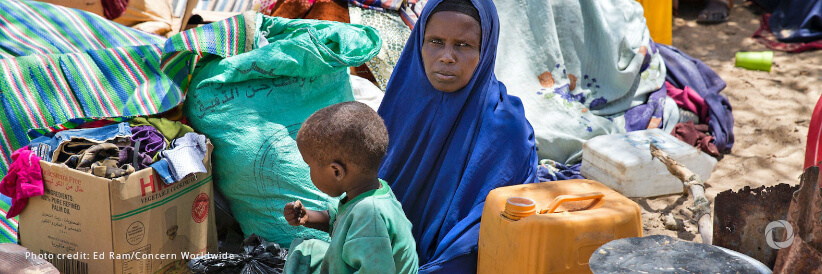Amid one of the worst hunger crises globally, Somalia’s humanitarian situation continues to deteriorate as funding decreases. With 4.6 million people forecasted to face severe levels of hunger by June, the number of severely malnourished children under five has jumped to 1.8 million from 1.7 million since the beginning of the year.
Of these, 479,000 are expected to be severely malnourished and at risk of dying without urgent help. As needs grow, critical funding is shrinking, with the food and nutrition sectors hit hardest, forcing life-saving aid operations to scale back or shut down.
“We know that in crises like the one we are witnessing, women and girls are always the hardest hit, said Ummy Dubow, CARE Somalia Country Director. “Every day, we hear countless human tragedies in the centers we run. Pregnant women sacrificing their nutrition, mothers watching their children waste away from acute malnutrition, and young girls being pulled from school to help families survive. Without adequate food, health, and nutrition programs, the burden of disease and death among women and children will rise sharply. The already overstretched and under-resourced facilities will buckle under increasing needs, and lives will be lost.”
Somalia’s malnutrition crisis is accelerating faster than predicted, worsened by seasonal challenges and the fallout from the 2024 drought. In 21 of the hardest-hit areas across the country, 36% of people are going hungry, up from 28% at the start of the year, and the number in emergency conditions has surged by 50%. The Somalia Humanitarian Needs and Response Plan is only 11.1% funded on 12th May. The food and nutrition sectors are the least funded, receiving just 2.9% and 3% of the life-saving support this year. With such critical underfunding, vital programs are scaling back or shutting down, putting millions at greater risk.
Severe underfunding of vital nutrition programs that provide life-saving supplements to young children, pregnant women, and breastfeeding mothers is putting lives at risk. Funding cuts have already forced the closure of health centers. This means patients must travel long distances, and this increases the likelihood of delayed treatment, stunting, and even death.
Severe underfunding of vital nutrition programs that provide life-saving supplements to young children, pregnant women, and breastfeeding mothers is putting lives at risk. Funding cuts have already forced the closure of health centers. This means patients must travel long distances, and this increases the likelihood of delayed treatment, stunting, and even death.
Sucdi, a mother, recalled the helplessness of watching her child slip away from severe malnutrition—until emergency care through a CARE-supported facility saved her child’s life, “I thought I had lost my child. She is alive—and as long as she is well, that is everything to me.”
CARE Somalia and its partners helped Sucdi, but the ability to help others is reducing daily due to dwindling funds.
Due to funding cuts, aid groups have had to scale down operations as Alinur Ali Aden, Executive Director of GREDO, indicated, “We have been forced to stop life-saving programs that supported thousands of women and children. For many, this is a death sentence. Pregnant and breastfeeding women now face even greater risks of losing their lives and their babies without basic health and nutrition support.”
As Somalia battles a deadly mix of conflict, climate shocks, and economic hardship, humanitarian funding is a lifeline that cannot be deprioritized. CARE urgently calls on the donors to honor pledges and scale up funding to prevent further suffering and needless deaths.

